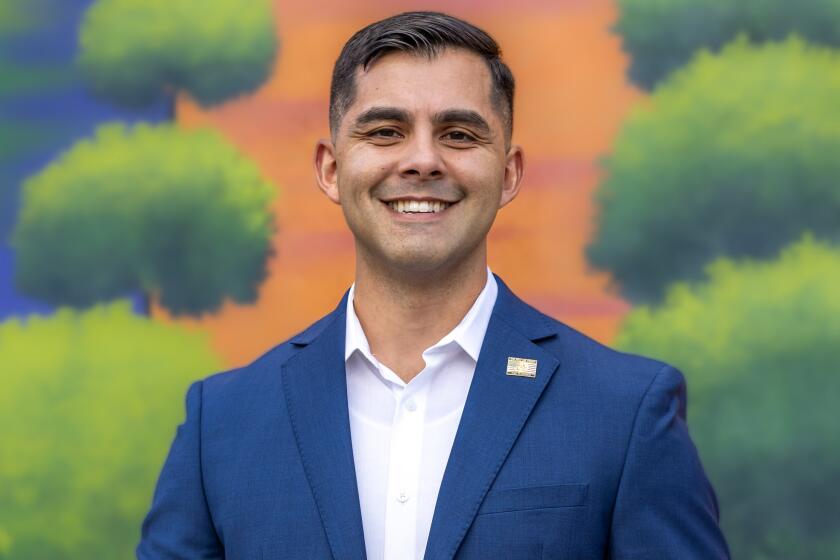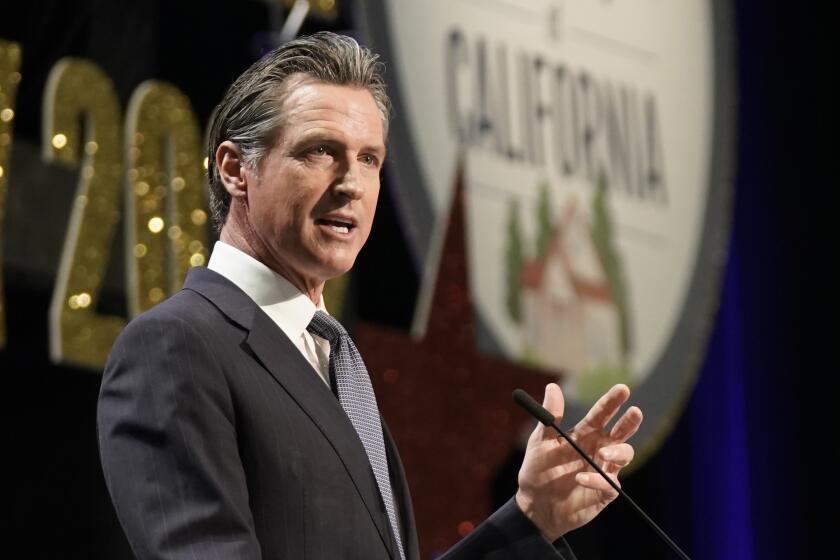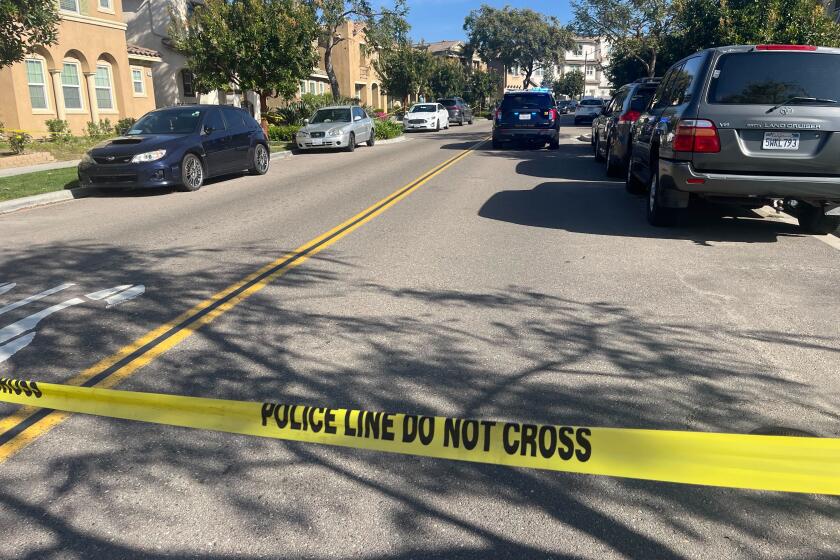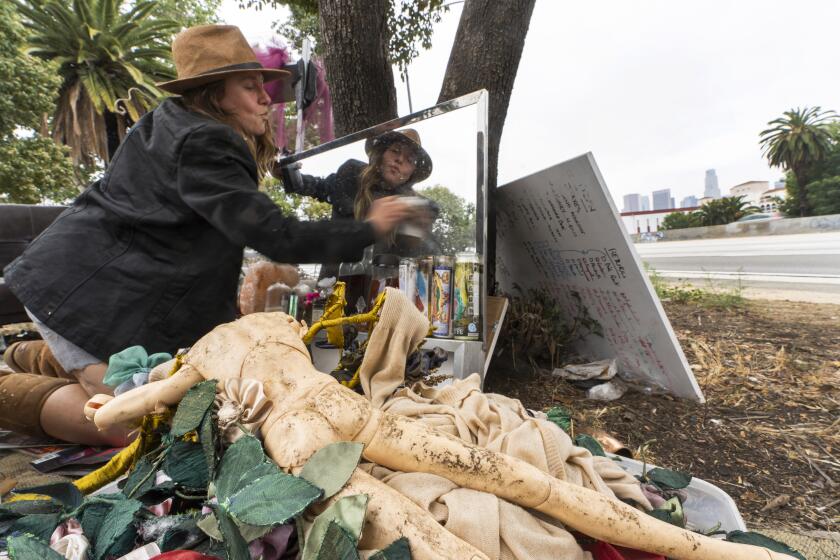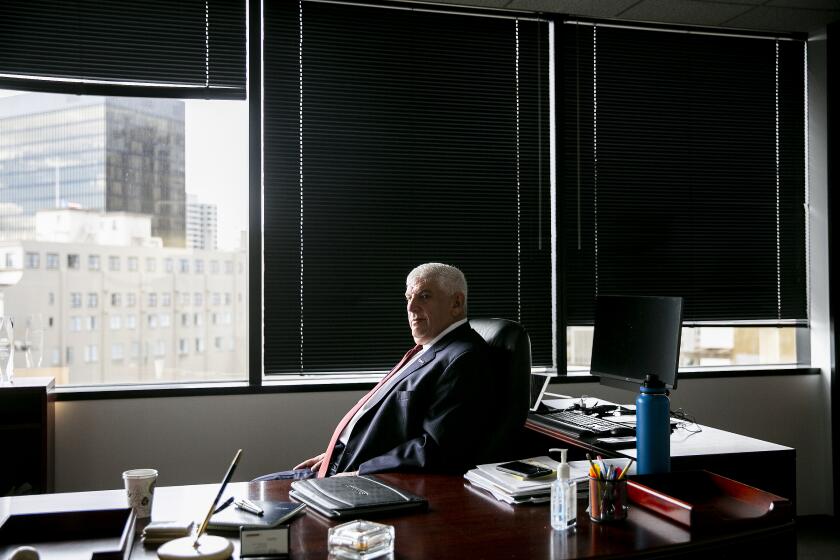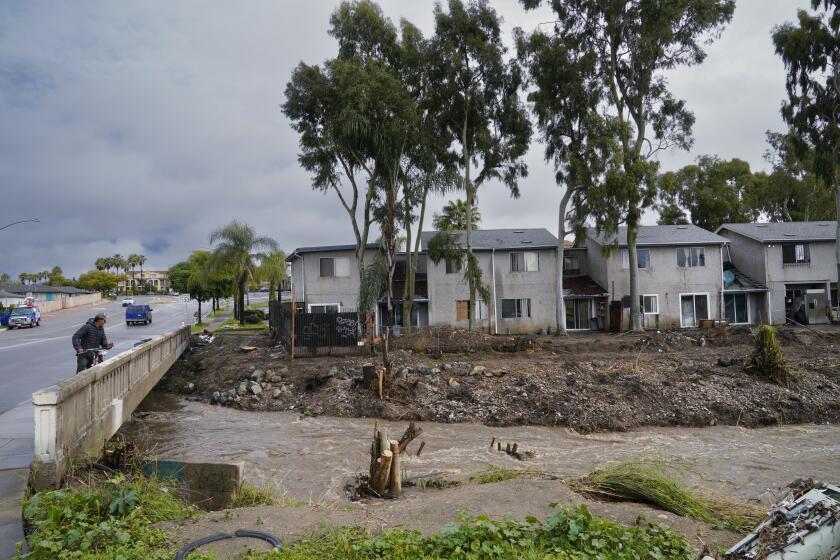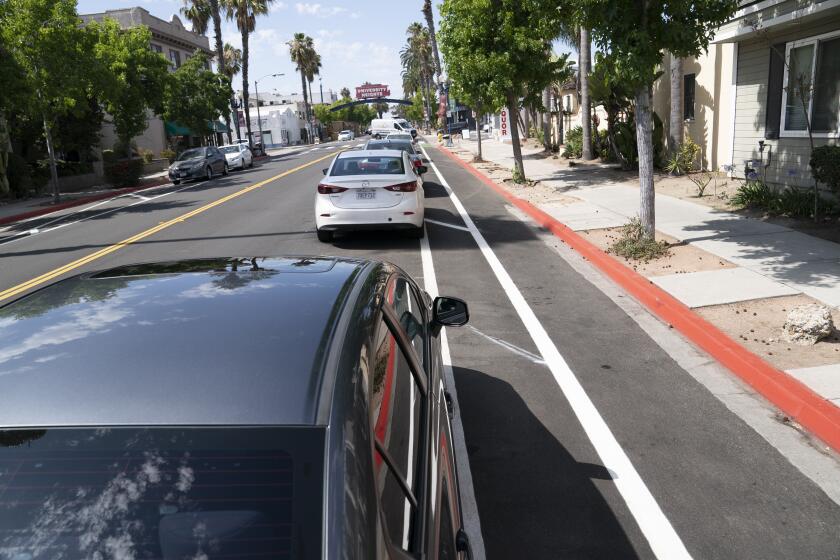2022 election: Q&A with Brian Jones, California State Senate District 40 candidate
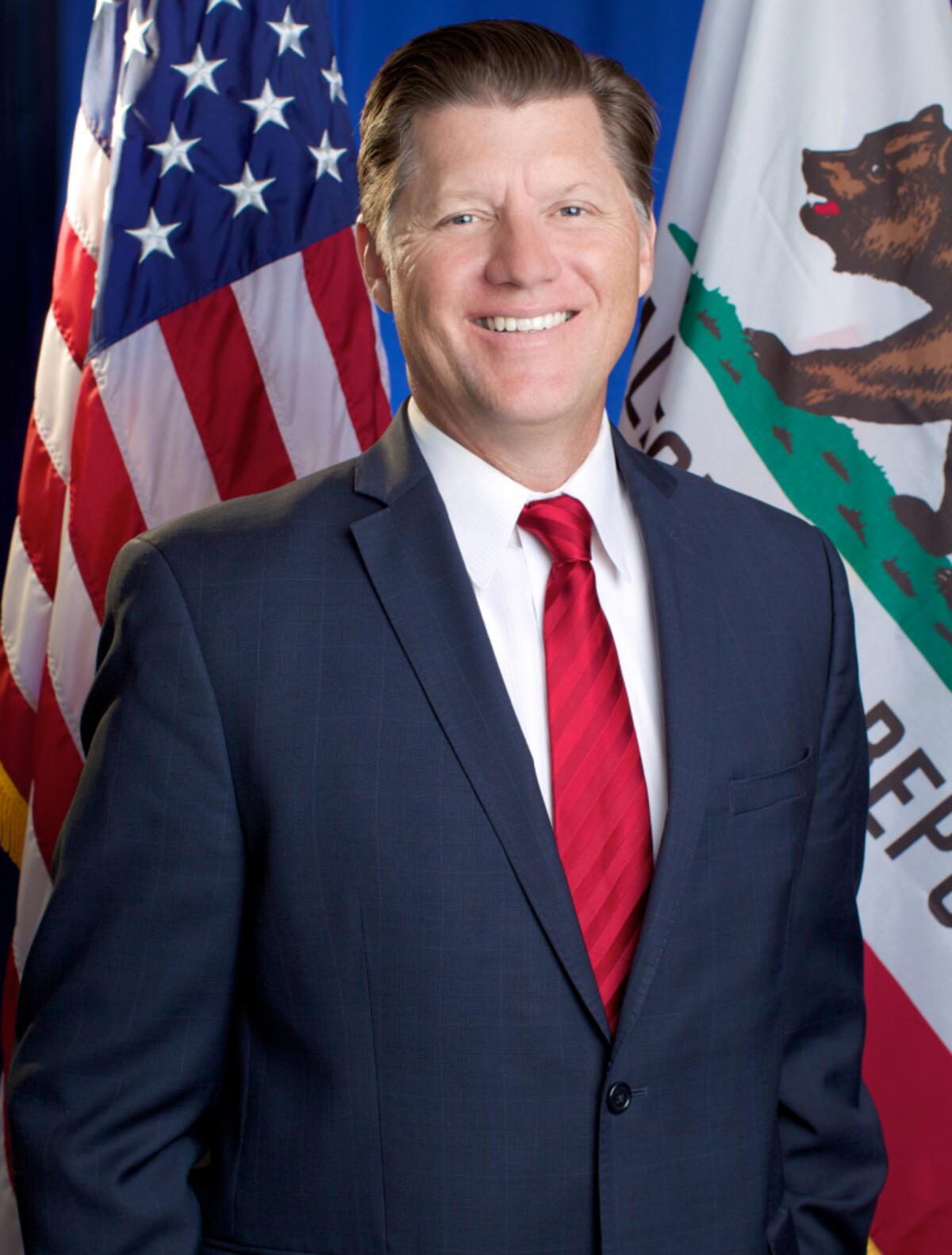
There are two candidates on the June 7 ballot in the campaign for state Senate District 40, which includes Escondido, Poway, Santee, the Mira Mesa and Rancho Bernardo neighborhoods of San Diego, Descanso, Lakeside and Ramona. They are state Sen./businessman Brian Jones, a Republican, and Marine Capt./attorney Joseph Rocha, a Democrat. The two will automatically advance to the Nov. 8 general election.
The San Diego Union-Tribune Editorial Board sent them a 13-question survey, and is publishing their responses here. If you have comments or questions about the election or any of the candidates after reading this interview, please email Editorial and Opinion Director Matthew T. Hall at matthew.hall@sduniontribune.com.
Below are Brian Jones’ responses and a link to other responses.
Q: From wildfires to sea level rise, the climate emergency is increasingly affecting California. What immediate steps should California lawmakers be taking to address it?
A: The most productive thing the Legislature can do is continue to allocate funding and resources to prevent wildfires. Over 60 percent of my Senate District is rural or semi-rural, and we are always at risk of another Cedar Fire. I believe we can reduce the frequency, fuel and intensity of wildfires. Some efforts are already in the works, including bipartisan legislation that I supported: Senate Bill 926 — a fund to pay for unintended damages of controlled burns; Senate Bill 332 — reducing legal liability of controlled burns; and Senate Bill 63 and Assembly Bill 642 — which both increase fire “hardening” efforts. We also need to hold Gov. Gavin Newsom and Sacramento leadership accountable to ensure wildfire prevention efforts are implemented effectively. Last June, a Capitol Public Radio investigation revealed the governor misled the public by saying that because of his executive orders 90,000 acres of land had been hardened against fires when the real number was 12,000 acres. Additionally, during budget hearings in 2019, Sen. Mike McGuire, D-Healdsburg, and I, as members of Senate Budget Subcommittee No. 2, questioned and held up the governor’s proposed Cal Fire budget item that underfunded both personnel and vehicles because it was not the proposal previously agreed to by the administration, legislative leaders and the Cal Fire employee organization. Unlike the mostly partisan headline proposals like mandating solar on homes and banning gasoline leaf blowers, our bipartisan efforts at fire prevention and hardening will produce real results not just for our climate but for the safety of our communities.
Joseph Rocha is one of two candidates running for a seat in the California State Senate District 40
Q: The governor’s pleas to reduce water use have been widely met with indifference. What, if anything, should state lawmakers be doing to address drought conditions?
A: Actions speak louder than words. Do you know why San Diego County has water infrastructure that helps us hedge against drought? I can point to numerous actions leaders in San Diego have taken that help: the Carlsbad desalination plant and the San Vicente dam raise, among others. I can assure you it is not because of the leadership in Sacramento that these improvements have occurred. It is because we have local water district leaders and a county water authority that have been committed to maintaining and developing our infrastructure.
Our state should take a similar approach. First, for the long term, providing funding and California Environmental Quality Act (CEQA) exemptions to build Sites Reservoir in Glenn and Colusa counties and Temperance Flat in the Central Valley. Second, it is beyond time to enact a twin tunnels plan with funding and CEQA exemptions. Last, in the short term, the state must stop flushing over 50 percent of our water out to sea and explore creative and balanced solutions. Water shouldn’t be a zero-sum game between the environment and California’s legitimate water needs.
Infrastructure funding and CEQA exemptions are not new ideas. In fact, they have been introduced and killed time and time again because the majority of Sacramento leadership has become captive to one side of the argument. We need to return to balanced solutions.
Q: What would you do to address the surging gas prices in California?
A: I have strongly called for the Assembly Transportation Committee to pass Assembly Bill 1638 that would have immediately suspended the state’s 51 cents per gallon tax on gasoline. That measure could have been passed and signed into law within a day if the governor and Democratic legislators would have agreed, but instead the Assembly Democratic leadership recently hijacked that bill and turned it into a new tax that could further raise gas prices. Additionally, I have proposed suspending the other 49 cents per gallon in state fees and taxes. The programs funded by these fees and taxes could be made whole by drawing on the $68 billion state budget surplus. We should terminate the debacle known as the high-speed rail project and instead use that money to fund promised road and highway projects. Gov. Newsom and Democratic legislators have halfheartedly suggested competing “gas rebate” proposals, but so far they are just proposals. I’m open to any reasonable proposals that would help Californians deal with not only high gas prices but other inflation-induced expenses as well as the continuing economic sluggishness, business closures and job losses caused by pandemic.
Q: How do you strike a balance between reducing the state’s dependency on fossil fuels and addressing energy affordability issues, including the high cost of gasoline?
A: Consumer choice and the marketplace should be preeminent as the state transitions from fossil fuels. Rome wasn’t built in a day. California’s approach should not be one where rapidly growing green energy mandates lead to blackouts, shortages and skyrocketing energy prices. The governor and legislative Democrats appear to agree as they have passed emergency legislation and orders that allow “peaker plants” to operate again and “dirty energy” to be imported from out of state, all actions that seem contrary to their stated energy mandates. I believe we need to put our trust in the consumers and the entrepreneurs in the private sector rather than the politicians and government bureaucrats in Sacramento who want to rush us into something we’re clearly not equipped to do yet.
Q: How would you bring down the high cost of housing, both for homeowners and renters?
A: First, we should repeal the mandate that every new home must be “solar-powered.” That requirement can add up to $9,000 to the cost of a new home. Second, we need to expand the renter’s credit as proposed in Senate Bill 843, authored by Sen. Steve Glazer, D-Orinda. I, along with 40 other legislators, have co-authored this needed measure. Third, let’s reduce regulations on cement, lumber, steel and other construction-related industries so those materials can be produced more readily in California rather than having to be imported from other states or foreign countries. Additionally, I’ll hold the line against any new tax proposals that could affect home construction, sales or purchases. Lastly, I’ll always fight any attempts to weaken or undermine Proposition 13, which has helped millions of Californians and their children hold onto their family homes over the last 44 years.
Q: Homelessness is growing dramatically across the state. How would you address it?
A: In early 2020, I introduced a five-bill package to address some of the core challenges related to homelessness in California. The Senate Democratic leadership never brought one of my bills up for a hearing or a vote. For years, the Newsom administration’s and legislative Democrats’ approach to homelessness issues can be summed up as “their way or the highway.” And that’s exactly what has happened: More and more homeless encampments are now springing up every day along our highways, on our streets and in our parks.
I have not given up, and in fact I recently joined with many of my colleagues and announced the Accountability, Compassion and Treatment (ACT) package of multiple homelessness measures introduced by numerous Republican legislators, including a bill of mine that passed a policy committee a few weeks ago.
My Senate Bill 1006 would authorize and provide grants for local law enforcement agencies that send “wraparound teams” consisting of a law enforcement officer, a social welfare representative, and a medical and mental health professional into homeless encampments not just to clear the camp but to assess homeless people as to their mental, behavioral and medical needs, then link them up with proper treatment programs and an appropriate housing facility.
The fact the majority of the Senate Public Safety Committee supported my bill might just show that the partisan wall on homelessness issues may be cracking, just a little bit. I hope it is.
Q: What, if anything, should the state do to make mass transit a viable option for commuters?
A: We should encourage and incentivize proven mass transit systems that are already in existence and are running near or at capacity. We should not be throwing any more tax dollars into the money pit known as high-speed rail.
Q: How will you balance public health with economic and educational concerns going forward in this pandemic or the next one? What specific steps and strategies, from lockdowns to mask mandates, would you recommend or rule out if there is a new surge in deaths and hospitalizations?
A: I think Californians learned and lost a great deal over the last two years during the COVID-19 pandemic. We need to recognize that the government-mandated shutdowns and restrictions caused damage that many individuals, students, families and small businesses of all backgrounds will take time to recover from. In addition, moving forward, we need to balance data from all sources — such as academic data, mental health data and public health data — to ensure we do not implement any one-size-fits-all policy that hurts more than it helps.
As far as what to do or not to do during, God forbid, the next pandemic:
Firstly, we as leaders must be much more cautious in the extraordinary powers we grant a governor because he or she will not willingly give them back. Secondly, be skeptical of promises made by politicians. Lastly, we need to be open-minded enough to learn how other states or local jurisdictions handled the pandemic before we implement sweeping mandates that lead to shutting down small businesses, schools, churches, parks and beaches.
Q: California has the strictest gun laws in the nation yet has had some of the nation’s worst mass shootings this year. What more, if anything, should be done to reduce gun violence in California?
A: First, we don’t need any more restrictions on the lawful use and possession of firearms by law-abiding Californians. Second, as we saw in the recent Sacramento shooting, violent career criminal gang members are making our communities dangerous. Too many laws have been enacted primarily along partisan lines in the last several years that make it tougher to prosecute and imprison these gang members and criminals. This has got to stop. Third, Proposition 47 (which reduced penalties for crimes in 2014), Proposition 57 (which allowed for early release from prison in 2016) and Assembly Bill 109 (Jerry Brown’s “realignment” in 2011 that moved hardcore, violent career criminals from state prisons to county jails, where many were subsequently released due to overcrowding) need to be repealed. These so-called criminal justice reforms were fraudulently sold to Californians as solutions to bring down crime but instead have law-abiding Californians fearing for their safety.
Amazingly, just a few days ago, a straightforward bipartisan measure to help deter illegal gun use and the theft of firearms was up for consideration in the Assembly Public Safety Committee. Assembly Bill 2545, authored by Assemblymember Al Muratsuchi, D-Torrance, would have allowed prosecutors to charge those who steal, sell or buy a stolen gun with a felony, rather than just a misdemeanor. The two Republicans on the committee voted for the bill, but the Democratic leadership had other ideas and two Democrats voted no while the three other Democrats didn’t vote at all. That commonsense bill died.
Q: California has adopted a number of criminal justice reforms in recent years. What would you change and why to ensure justice is equitable and effective?
A: I have opposed almost all of these so-called reforms. As I mentioned previously under the mass shooting question, I favor the repeal of most of the justice reform laws and initiatives enacted in recent years.
People who commit nonviolent crimes and are clearly trying to turn their lives around may deserve a second chance. Those who are career, violent or hardened criminals are too dangerous to turn loose on our streets and must serve their entire sentence.
Q: What single change would you make to improve California’s K-12 public school systems?
A: I’d empower parents to make the educational choices that work best for their family, whether that is in the form of public school, charter school or home school. This can be achieved not just through organizations but individually with the right to meet with their school’s administrators and teachers every summer to go over the exact plan to educate their child during the upcoming year. Parents deserve that kind of direct access to their child’s education. This way there would be no surprises during the middle of the school year when a parent happens to hear from their child that a new controversial class or subject matter has suddenly been implemented.
Q: Should taxes in California be increased? If so, which ones?
A: Absolutely not. The cost of living is already too high in California. Families young and old are fleeing the state. A recent UC Berkeley Institute of Governmental Studies survey showed 64 percent of Californians think taxes are too high, 26 percent believe they are about right, 1 percent think they are too low, and 9 percent have no opinion. I can certainly say I haven’t run into any constituent who has no opinion on taxes in my district.
With a $68 billion state budget surplus built on the backs of hardworking Californians, we certainly don’t need any more taxes.
Q: What is the most important issue we have not raised and why?
A: California state government inefficiency and intrusion in our lives. Every year major corporations, small businesses and families young and old are deciding to move out of California not just because of high taxes, but also because of the hassle many of the overregulated processes implemented by government agencies have on our daily lives.
At some point, California needs to start rolling back regulations, rules and restrictions to empower us to do business here, work here and raise a family here. I started my family here, and it is where I want to stay.
All voters in California, especially solution-oriented Democratic voters, need to realize that the governor and the majority of the legislative leadership are currently held hostage by the far-left special interests in Sacramento. These are the same special interests that have been driving California into this ditch and continuously fighting commonsense solutions to our most pressing challenges (regardless of whether those solutions come from Republicans or Democrats). To fix California at this point, we need all voters to vote for the best solution-oriented candidates regardless of party so we can restore constituent-oriented balance to the Legislature.
Many voters receive their information from social media. Please follow me @SenBrianJones or @electbrianjones for updates on my efforts to fix the Golden State.
Get Weekend Opinion on Sundays and Reader Opinion on Mondays
Editorials, commentary and more delivered Sunday morning, and Reader Reaction on Mondays.
You may occasionally receive promotional content from the San Diego Union-Tribune.
